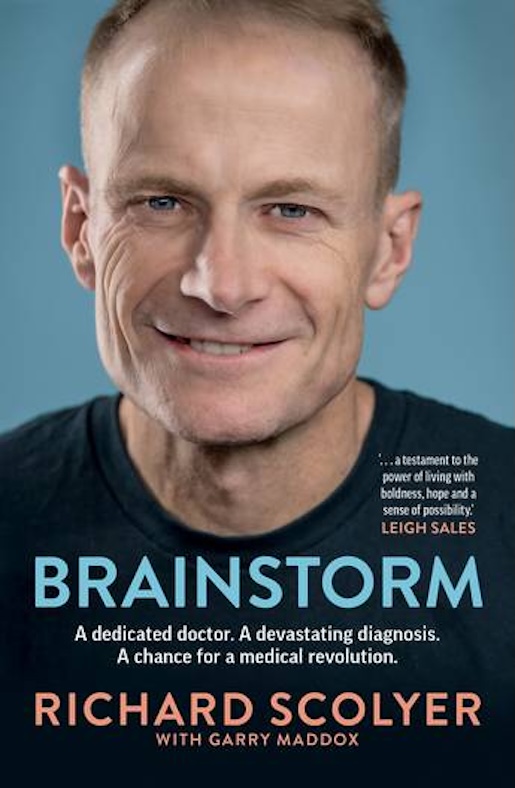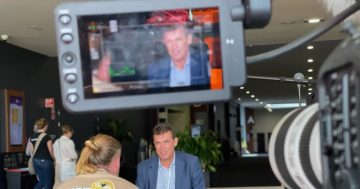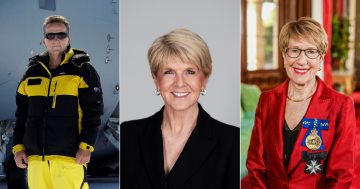
Brainstorm is the incredible story of 2024 co-Australian of the Year, Professor Richard Scolyer, who uses his groundbreaking melanoma science research to fight his own ”incurable” brain cancer. Photo: Supplied.
Divulging his personal fight against a diagnosis of “incurable” brain cancer, Brainstorm is the extraordinary story of former co-Australian of the Year, Professor Richard Scolyer.
The memoir is about his remarkable journey from being a world-leading melanoma doctor, who had saved thousands of lives, to becoming a brain cancer patient fighting for his own recovery through his own pioneering experimental treatment.
After being diagnosed with “the most aggressive and lethal type” of glioblastoma in 2023, he has been undergoing experimental treatment, including pre-surgery combination immunotherapy, with his own team, having publicly shared his journey.
In early March, Professor Scolyer revealed the brain cancer he had been fighting with a novel treatment had grown back, and he was facing the final months of his life. Here’s a dedicated doctor. A devastating diagnosis. A chance for a medical revolution.
Professor Scolyer is a pathologist, a senior staff specialist in tissue pathology and diagnostic oncology at Royal Prince Alfred Hospital, co-medical director alongside Professor Georgina Long at the Melanoma Institute Australia, and Conjoint Professor, Sydney Medical School, Faculty of Medicine and Health, The University of Sydney. He was honoured, along with Professor Long, as 2024 Australians of the Year.
Skin cancer is Australia’s most common cancer, and melanoma is the deadliest form of it. Dr Scolyer, with his colleagues at the Melanoma Institute Australia, has dedicated years to groundbreaking research and transformed even the most advanced forms of melanoma into a largely curable disease, bringing hope and healing to many.
He is passionate about the power of research, along with sharing insights to change the face of medicine and cancer treatment specifically. His hope is that by documenting and sharing his personal journey with glioblastoma, he can contribute to that life-changing body of research.
Professor Scolyer said his brain cancer diagnosis had come suddenly, and without warning.
“No one saw it coming, least of all me,” he said.
He was fit, having represented Australia at the world aquathon championships in Ibiza. The health drama unfolded in Poland, where he was with his wife, Dr Katie Nicoll, having hiked in the mountains the day before.
“I woke the next morning not feeling quite right.”
He was rushed to hospital and after a number of tests, Professor Scolyer was diagnosed with glioblastoma IDH wild-type, a cancer that’s considered untreatable and usually fatal within six to nine months.
The emotional pain of this verdict was distressful.
“I was shocked and found myself falling into a black despair,” Professor Scolyer writes.
“I was panicking. I was scared. I asked lots of questions about whether the lesion could be anything else, what the expected rate of progression was, what the treatment was … it felt like my life as I knew it was over … I knew the usual outcome for people with a high-grade glioma was shockingly bad.
“I felt so many emotions. I was devastated, sad, overwhelmed and despairing. I was terrified it was a fatal diagnosis and anxious about what lay ahead. And when I studied the scan, I was angry that my life was being turned upside down.”
He also voices the rewarding time in his life at Sydney’s Melanoma Institute as they continued to make real progress in reducing deaths from melanoma, a cancer that is found at higher rates in Australia than in any other country.
“We were part of a team of world leaders in pioneering immunotherapy, a relatively new form of treatment that uses powerful drugs to supercharge the body’s immune system so it can find and destroy cancer cells. In fifteen years, the five-year survival rate for advanced melanoma had gone from a dismal five per cent to a remarkable 55 per cent; tens of thousands of lives around the world were being saved.
“We’d made so many advances that, in an outdoors-loving country where once more than 2000 people died from melanoma every year, at the Institute we’d been able to set our sights on zero deaths.”
Highlighting Dr Scolyer’s selflessness in his endeavours, Brainstorm is not only an astonishing biography, but it inspires in more ways than one. It’s evidence of the power of living courageously, with optimism, a sense of believability and where altruism shines bright.
Emeritus Professor John Thompson, of the Melanoma Institute Australia, speaks for us all with this statement:
“Passionate about his family and his work, an outstanding medical researcher and mentor always seeking to help others, Richard Scolyer is facing the greatest challenge of his life with courage and characteristic determination, inspiring the nation.”
Brainstorm, by Richard Scolyer with Garry Maddox, Allen & Unwin, $34.99







